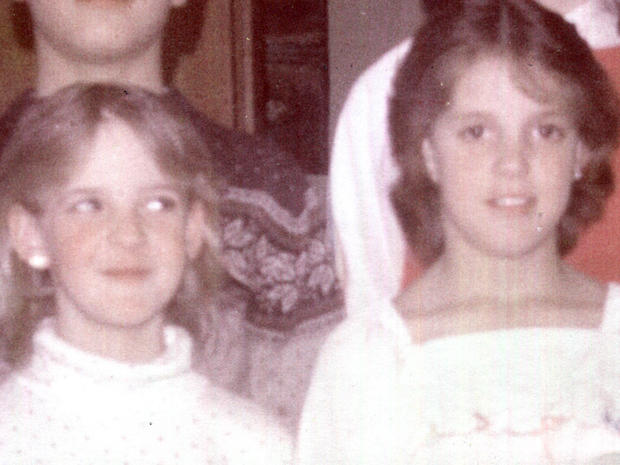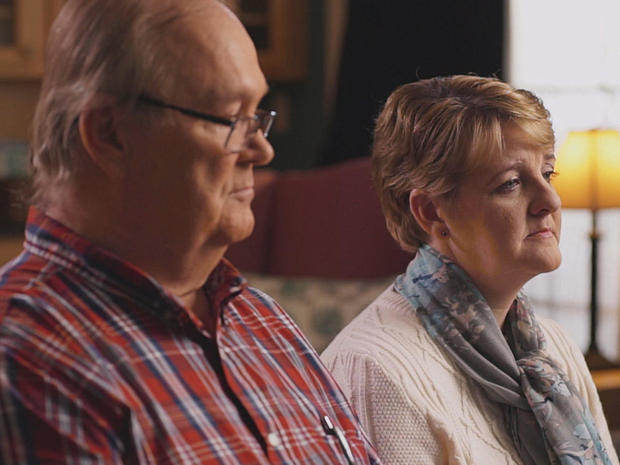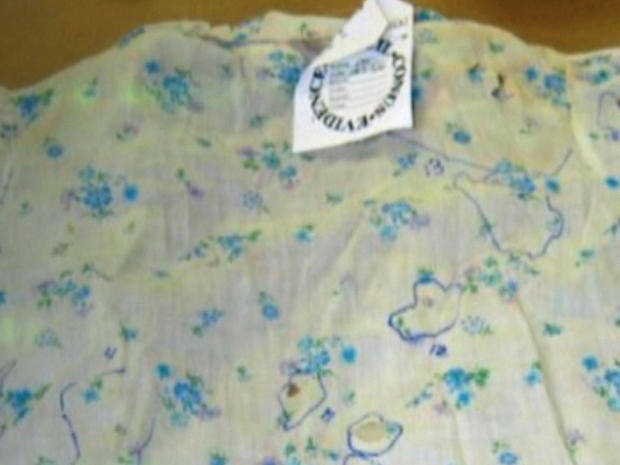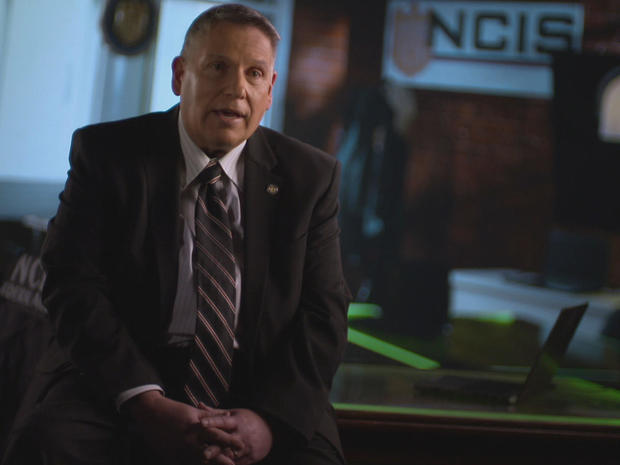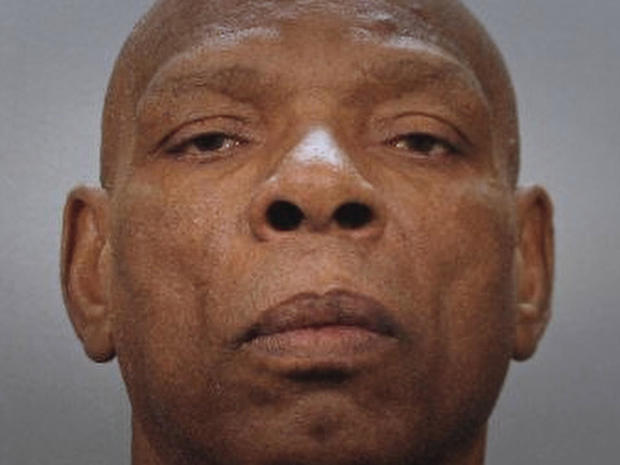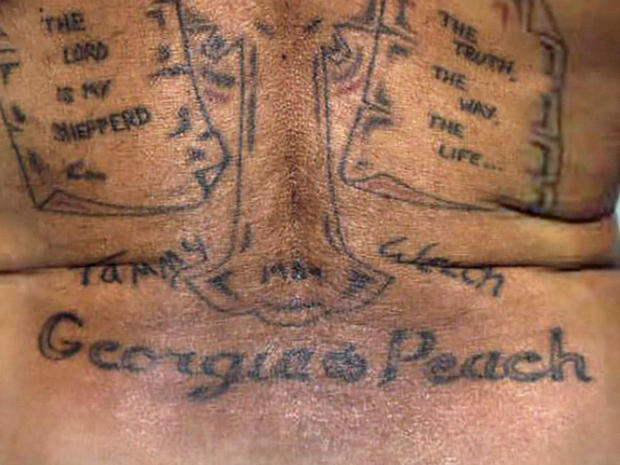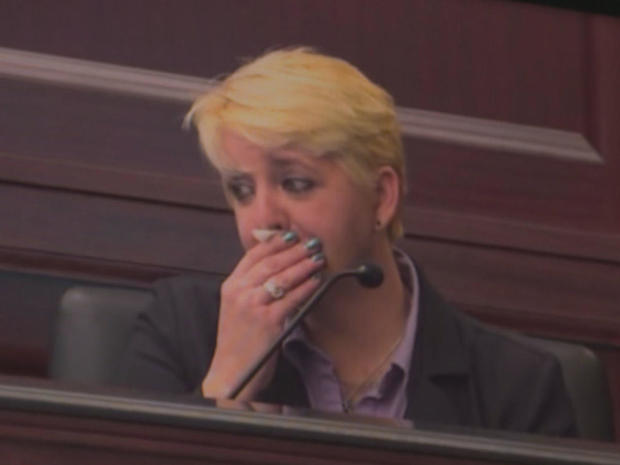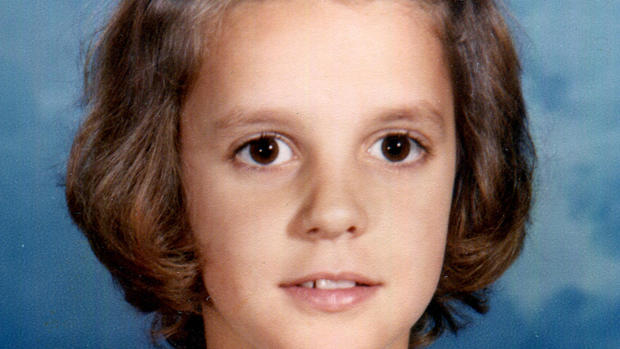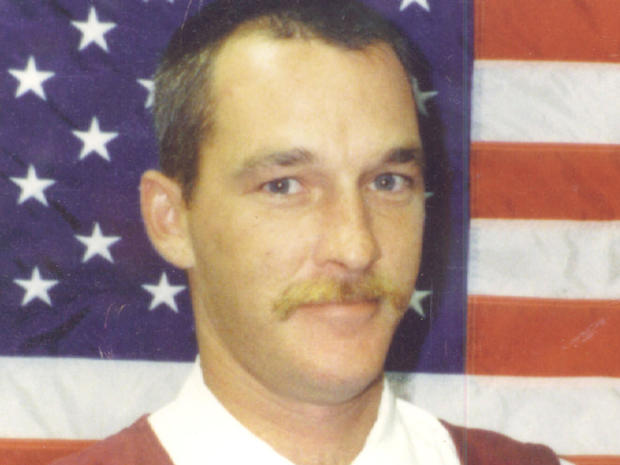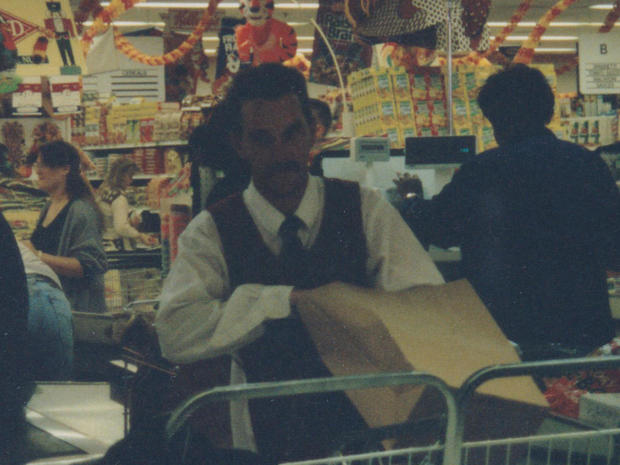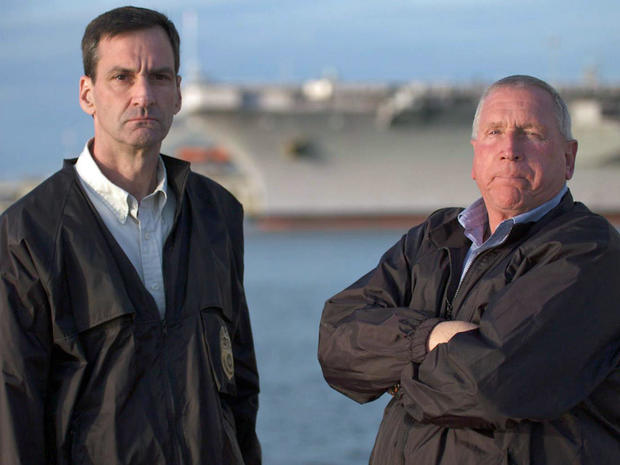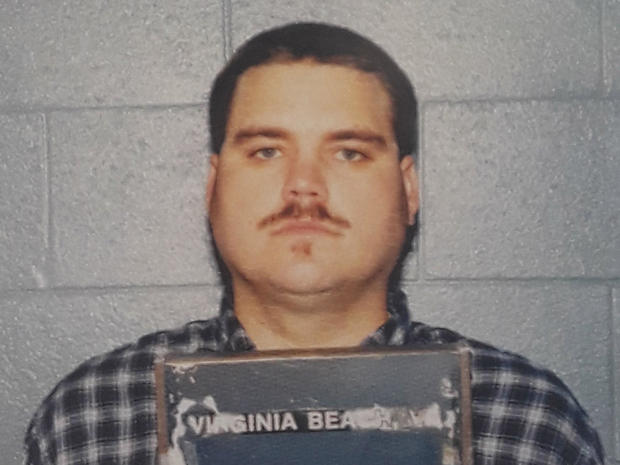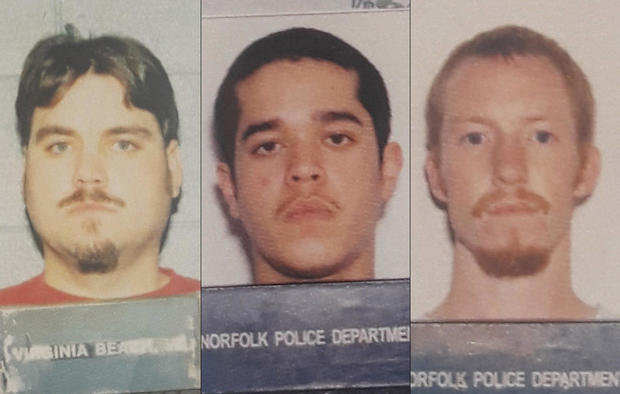Produced by Jonathan Leach and Caroline Sommers
Real-life NCIS agents open up about the murder of a sailor’s 10-year-old daughter that haunted the agency for three decades and the “unsolvable” murder of a Navy man’s son and the promise to his family to resolve the case.
NEVER FORGET: TAMMY WELCH
Few cases have had as devastating and lasting effect on the agents of NCIS than the case of 10-year-old Tammy Welch. Her story was barely written when she was murdered on Aug 27, 1984.
Trending News
Tammy and her sister, Jennifer, were outside playing in an apartment courtyard the day their family was moving to Navy housing in Jacksonville, Fla. Jennifer went inside to talk with her mother, leaving Tammy alone outside. When she went back out 30 minutes later, Tammy was face down in the grass, dead. She had been brutally strangled and assaulted.
The identity of Tammy’s killer would remain a mystery and like so many unsolved cases, would languish for years with only the hope that one day justice would be served.
Michael Welch |Tammy’s father: I always thought Tammy would be somebody special someday. … She was … an exceptional child.
The pain carried by Tammy’s father Michael, who was out to sea on the USS Eisenhower when his daughter was murdered, her mother Nancy, and her younger sister Jennifer has been unbearable.
Jennifer Welch | Tammy’s sister: She was a spark. But it was the spark that made it so you felt everything about her. … Tammy and I loved–music. …And she would literally make me dance with her. … We would tease our hair backwards so that way we could jump on the beds and just shout that “Girls just want to have fun.” It was the 80s [laughs].
Jennifer Welch: Losing a sister affected me in horrible ways. … It wasn’t time to say goodbye. It wasn’t time to move on. … Every time I try to remember the dancing, the jumping, the playing, it always rolled around back to walking around the corner of the house.
1984 WJXT REPORT: Only minutes before, neighbors had seen Welch playing with her … younger sister. … The next thing anyone knew she laid dead.
Michael Welch: As a father who lost their daughter, it’s very hard. … I’d never ever dreamed… that this would happen.
To this day, Tammy’s mother has never recovered from the loss of her daughter, leaving Michael and Jennifer to tell their family’s painful story.
Jennifer Welch: Someone murdered my sister Tammy… and my family deserves answers.
Lou Eliopulos | NCIS Investigative Review Specialist: There were … suspects that were at the top of our list. … but without any physical evidence there was no way to include or exclude any of them.
The original investigators interviewed every possible suspect in 1984. But with no leads and no new evidence, the case was officially closed less than a year later.
Lou Eliopulos: We feel compelled where a Navy dependent has been killed while the service member is serving their country … to investigate that case and to bring it to resolution. … We’re motivated by that.
Since the day she was murdered , Tammy’s case would haunt the agents of NCIS.
Jennifer Welch: Lou from NCIS … would keep in contact with me. … It was one of those things where you could tell … they were carrying my burden, too.
Lou Eliopulos: The reason why we do this investigation is to convict the bad guy.
Lou Eliopulos: It’s hard to wrap your head around … how lucky was this person.
But in 1999, NCIS’ cold case squad reactivated Tammy’s case, determined to bring justice to her family.
Lou Eliopulos: We knew there was a killer out there. … We were going to do everything we could to solve the case.
Lou Eliopulos: I can’t tell you how many times you go over the photographs and the investigative reports looking for that clue that that you may have missed.
The cold case agents suspected Tammy’s killer left DNA at the scene, so investigators screened for forensic evidence — something that wasn’t possible in 1984.
Bridgette Matter: In the 1990s, DNA was being used to help solve crimes. It was a tool that they hadn’t used before.
The sexual assault kit from the crime scene yielded no results, but when agents screened Tammy’s shirt they got a hit.
Bridgette Matter: …Analysts, they actually found a … foreign DNA profile … That DNA did not belong to Tammy and — it had to have belonged to the killer.
This new DNA profile would become crucial in NCIS’ hunt for Tammy’s killer.
Alan Mizrahi | Assistant State Attorney, 4th Judicial Circuit: When NCIS took over the investigation of the case … they tried to find every male … in that apartment complex to try to get their DNA so they could compare it to the DNA samples that were taken from Tammy.
But 15 years had passed – and those suspects could be anywhere.
Pam Hazel | Assistant State Attorney, 4th Judicial Circuit: They literally flew across the country seeking out every one of those males to get … DNA cheek swabs to see … if they can be compared to evidence in the case.
NCIS was able to obtain DNA from more than a dozen potential suspects — including a key person of interest from 1984: building superintendent Marty Simms.
Lou Eliopulos: Simms became a suspect because of a neighbor that lived near where the body was found. She reported seeing a maintenance man there earlier passing by. … He was interrogated pretty harshly by our special agent.
Prosecutor Alan Mizrahi: Marty Simms … had the master key to all the apartments in the complex. It would have been easy for him to go in and out of apartments, would have been easy for him to take Tammy Welch and bring her into an abandoned apartment.
Lou Eliopulos: Marty’s alibi was that he had overslept that day and didn’t come out of the apartment. His wife … verified that he was in bed at that time.
And when Simms’ DNA failed to match the new DNA profile, he was cleared as a suspect.
As the investigation continued, agents shifted their focus to the Welch’s next-door neighbor, James Jackson. He had been cleared back in 1984, but by 2002 had racked up a long list of criminal convictions.
Prosecutor Pam Hazel: Jackson had been in the military earlier in his life. … And he was a cook.
Lou Eliopulos: James Jackson … was married at the time had two children, including a daughter that was Tammy’s age. … He indicated he didn’t know anything about the case and that he was sleeping in his apartment … at that time in which her body was found.
When NCIS spoke with Jackson, he denied ever knowing Tammy Welch and willingly provided his DNA to agents; but he, too, wasn’t a match. Seemingly at a dead end, the case was about to go cold once again, that’s when NCIS got a call that would change everything.
Lou Eliopulos: I got a call from the lab. And they said, “good news and bad news. Good news is we found the contributor of the DNA. The bad news is it’s me.”
For some inexplicable reason, a forensic analyst had somehow transferred his own DNA to Tammy’s clothing when the case was re-opened.
Prosecutor Alan Mizrahi: One of the analysts … somehow put some of his DNA onto that blouse … by sneezing or just talking. … Small particles of saliva can leave your mouth and they can end up on items of evidence.
Agents feared with that compromised DNA would they ever find Tammy’s killer?
But in 2004, a new suspect emerged — a former neighbor with a bizarre story of what happened the day Tammy died.
A NEW SUSPECT?
Lou Eliopulos: One of the things that you look at in cold case when you’re reading the file – you look at people that insert themselves in [the] investigation. … Twenty years after the murder one person called us and wanted to know … about whether or not the case was resolved. …That was Michael Carver.
Bridgette Matter: Michael Carver was a friendly neighbor. He was a sailor who lived across the courtyard in the same apartment complex. … Tammy Welch knew Carver, because she would go over to his home and play with his pets.
Twenty years after Tammy’s murder, NCIS was contacted by Carver, who told agents for the first time that Tammy had visited his apartment the day she died.
Lou Eliopulos: He was supposed to help the family move and he … had been visited by Tammy and said that he was on his way over. Instead, he was watching a TV show and never came over.
After learning what had happened, Carver told agents that he rushed to the courtyard and attempted CPR on Tammy. But when investigators arrived, he left the scene.
Bridgette Matter: Because Michael Carver had been silent all of this time … investigators were very suspicious. … Naturally, they thought maybe he could have been the killer. … And they had thought … that the murder might have occurred in his apartment.
Gregory Ford | Executive Assistant Director, NCIS Criminal Investigations: When we have an individual … from … years ago … offer assistance, investigators are right to be skeptical. … We take nothing for granted.
Agents soon determined that it would have been impossible for Carver to kill Tammy in his apartment and carry her body across the courtyard undetected. The agents realized that Carver was simply a victim of his own conscience.
Lou Eliopulos: Michael Carver … always felt guilty that he didn’t come over … and help the family move. … He thought that he may have been able to prevent Tammy’s death.
Bridgette Matter: Because of the compromised DNA, the killer was still out there. … So, investigators still had to figure out who actually did this.
Prosecutor Alan Mizrahi: The amount of time wasted on this case chasing down false leads was tremendous. Basically … years of false leads led detectives, crime labs, to not bring Tammy Welch’s killer to justice.
Lou Eliopulos: This case needed to be resolved. You work it so hard and you feel almost that you deserve a break.
In 2012, science would finally catch up with the investigation when Tammy’s case received a substantial grant for advanced DNA testing — offering new hope in identifying her killer.
Bridgette Matter: They used this advanced DNA testing on Tammy’s sexual assault kit. … The testing only screened male DNA.
Less than a year later, investigators would discover a partial DNA profile which excluded all male suspects — except one.
Lou Eliopulos [at his office desk]: … What we’re looking at is the DNA. …There’s only one person that lived in that apartment complex who matched that unknown specimen taken from Tammy Welch … and that was James Jackson.
Lou Eliopulos: Waiting all these years. We finally got the break. And the break was incredible.
Jennifer Welch: I got the call from Lou with NCIS. … He said, “we got him.” I mean, you wait so long to hear those words.
Bridgette Matter: In 2013, the Jacksonville Sheriff’s Office announced the arrest of James Leon Jackson.
JACKSONVILLE SHERIFF JOHN RUTHERFORD [to reporters]: I would like to announce an arrest in this heinous murder case that has been gone unsolved for the past 28 years.
James Jackson was charged with first-degree murder and sexual battery in the death of Tammy Welch.
JACKSONVILLE SHERIFF JOHN RUTHERFORD [to reporters]: I would like to highlight… the Naval Criminal Investigative Service … they have truly helped us to bring this child’s killer to justice.
But NCIS soon learned that the new DNA evidence linking Jackson to Tammy’s murder would prove to be less than definitive.
Prosecutor Alan Mizrahi: Because the DNA had degraded so much over the years, the crime lab was only able to compare a partial DNA profile.
Lou Eliopulos: It’s not specific to one individual. It’s a paternal link. So, it doesn’t necessarily mean it’s James Jackson’s DNA. It could be James Jackson’s dad, James Jackson’s son, James Jackson’s cousin, anyone that came down on the paternal side.
NCIS interviewed all of Jackson’s male relatives. One by one, they were eliminated as suspects, leaving agents convinced that James Jackson was the killer.
Jennifer Welch: When we did go to trial, a part of me did have a huge fear because the word “partial.” … You can’t get a partial haircut. You can’t partially do something, so it was huge.
Gregory Ford: Going into trial with a partial DNA link … you never can know how a jury will interpret that evidence.
Prosecutor Pam Hazel: Even when you have the perfect evidence. … You never know what will happen. … And in this case, we — had less than perfect evidence.
A CONFESSION?
In 2018, after years of legal delays, Tammy Welch’s alleged killer James Jackson would finally stand trial for murder. Besides the new DNA profile, investigators would need hard evidence to win a conviction. And what they found was a confession — written in ink.
Bridgette Matter: Thirty-four years after Tammy’s murder, investigators discovered something that was extremely bizarre. … While James Jackson is awaiting trial, he’s incarcerated … and he gets the tattoo, “Tammy Welch, 1984,” on his lower back. 1984 is the year of her murder.
Lou Eliopulos: We felt that that was significant. … The cross, if you look at it, it actually looks like a wolf. … The snout with the eyes and the nostrils. … Typically, you know, a wolf is considered a predator.
Jennifer Welch: The minute they told me that he had her name tattooed on … him … I had absolutely no doubt … the man that I would eventually have to look at was her murderer.
At his trial, where he faced the death penalty, Jackson, then 66, continued to proclaim his innocence:
ATTORNEY: Did you know Tammy Welch?
JAMES JACKSON: No. Never, knew — never knew her family.
Jackson testified that he had no idea about the “Tammy tattoo,” claiming that while in jail, he had asked a tattoo artist for a touch-up and it was written without his knowledge.
JAMES JACKSON [in court]: It was a little girl … I wouldn’t kill no little girl.
But one of Jackson’s jail mates testified that he confessed to killing Tammy while awaiting trial.
INMATE/WITNESS [in court]: I just told him, “You can tell the truth.” And he was like, “If I do I’ll never get out of jail.”
But it was testimony from Tammy’s younger sister Jennifer that prosecutors had hoped would weigh on the hearts of jurors.
Prosecutor Pam Hazel: Jennifer Welch testified about the last time she saw her sister alive. … It was extremely emotional for everyone in the courtroom.
Jennifer Welch: I wanted so bad to just … learn how to actually forget. … I was a little girl seeing that every single day.
JENNIFER WELCH [in court]: I kept walking and then I saw her shoes and then she was just lying there.
Jennifer Welch: But I absolutely would not and could not forget … because I wanted to be the voice she would never have.
Lou Eliopulos: On November 30 … the jury got the case, and … they’re in deliberation for several hours. … And the longer that they’re out, the more nervous you get. … You never know what a jury is going to do.
Jennifer Welch: It got to the point of it felt like, “this isn’t good.” … And my dad was actually starting to get to the point where, “we just lost.”
After a three-day trial and nine hours of deliberation, there was a verdict: guilty of first-degree murder.
Jennifer Welch: The minute they said “guilty” … I was just like, “oh, my god. It’s over.” … I had been waiting for 34 years — to hear one word. And I got it.
Michael Welch: I always told myself that hopefully I would live long enough to be able to see that person come to justice.
Prosecutor Pam Hazel: A month later the jury came back to hear the penalty phase. … Michael Welch was able to finally tell … James Jackson what he had taken from that family.
MICHAEL WELCH [at sentencing]: In a few days we will celebrate another holiday, and I will stand there looking at an empty seat for the 35th year. … [In tears] There’s not a day that goes by that daddy does not think about you Tammy Jean, my sweet daughter.
Jennifer Welch: I just remember thinking to myself, “I know what it’s like to lose a sister. I know what it’s like to lose a best friend. God, never let me have that feeling of having to lose a child.”
When it came time to decide Jackson’s fate, all but one juror chose to spare his life.
Prosecutor Pam Hazel: I’m not sure that anyone is saying that he doesn’t deserve death. The jury just recommended life in prison.
It was a decision that Tammy’s father found hard to accept.
Michael Welch: I told the state’s attorney in Florida that justice was blind. … They gave him mercy for some reason. He didn’t give her mercy [emotional].
Lou Eliopulos: That was his daughter … and until you’re in his shoes, you know, I can’t begrudge him on that. And I can understand exactly where he’s coming from.
Jennifer Welch [emotional]: Every time I think of her, the tears that I cry. That’s the love that she gave. … That’s her coming back.
Today, the memories of Tammy remain alive in the hearts of her family who choose to remember her not for the life that was lost, but rather, for the life that should have been.
Jennifer Welch: I decided to name my daughter Tammy Jean. … To honor her would be to take her name and give the world back, Tammy Jean.
NEVER FORGET: RICKY WILTROUT
“To the living we owe respect, to the dead we owe truth.” That’s a motto the agents of NCIS live by. To speak for the victims who can’t speak for themselves is their mission in pursuit of justice. Some of the hardest cases these agents face is when a parent loses a child. And the disappearance of Ricky Wiltrout was one of those cases.
Lou Eliopulos | NCIS Investigative Review Specialist: Ricky … had had dropped out of the 10th grade. Everyone in the neighborhood knew him, they had lived there for years.
From the beginning, Ricky Wiltrout had a tough life.
Special Agent Tony Suchy | NCIS: His mom said he took a fall and landed on his head — as a young child, and that resulted in some diminished mental capacity.
Special Agent Bill Heath | NCIS: I would guess Ricky’s chronological age and mental age were somewhat separated. He was kind of considered a little slow.
In 1997, Ricky was living at home with his parents Richard and Mary in Norfolk, Virginia. Ricky’s father was a Navy man, and Ricky – a young looking 30 – worked at the grocery store on the nearby naval base.
Lou Eliopulos: He was working as a bag boy and collecting grocery carts at … the Navy commissary. He was very proud of his job. He carried his ID with him wherever he went.
Pilar Burns | Ricky’s boss: Never have no complaints. Everybody just like him. We just like him. He was just a nice person.
Ricky and his brother Scotty grew up in a working-class neighborhood called Glenwood Park.
Gregory Ford, Executive Assistant Director, NCIS Criminal Investigations: Glenwood Park is a subdivision within the City of Norfolk, but it is surrounded by the Norfolk Naval Station. … There are railroad tracks there where the youth of the area congregate, hang out, both during the day and in the evenings and do what young people do.
That meant partying – sometimes, with a rough-and-tumble crowd. But Ricky always came home.
Lou Eliopulos: Ricky was very close to his parents, especially his mom.
Special Agent Tony Suchy: Spending a lot of time with his mom, I would say he was a mama’s boy.
Lou Eliopulos: Sometimes he would spend the night out fishing, but he would always call.
Special Agent Tony Suchy: He was never gone from his home more than a few hours without checking in with his mom. … And she would always leave the back door unlocked for Ricky.
Special Agent Tony Suchy: And then September 11, 1997, he didn’t come home that night. And he hadn’t been home since. And I couldn’t help but really begin to feel for Mary.
Greg Ford: This case was an absolute mystery for the family. Where was Ricky Wiltrout?
WHERE WAS RICKY?
The morning after Ricky Wiltrout’s disappearance, his mother sprang into action.
Special Agent Tony Suchy: Mary began to conduct what I would call her own investigation. She began to talk to as many of Ricky’s friends as she could find. And it was the same question she would ask: “Where was Ricky?”
Special Agent Tony Suchy: She did make a report to the Norfolk Police Department that Ricky was missing, but what she was told — and it’s true — is that Ricky was 30 years of age … and he could make his own decisions. So, there was really no investigation per se.
As weeks turned into months, it seemed Ricky Wiltrout had vanished into thin air — until February 1999.
Special Agent Bill Heath: Some surveyors were doing some work on board Norfolk Naval Base property in a wooded area, heavily wooded area. And they came across some bones. … And then NCIS was notified and a team of agents responded to the woods in order to assess what we had.
Local news covered the story. And watching was Ricky’s brother Scotty, who called NCIS.
Lou Eliopulos: He … saw where the remains were located, knew that was an area that they would hang out, drink alcohol, fire guns, smoke dope. He knew his brother was missing around that time period and gave a description of his brother.
Scotty reported what he knew to NCIS, but no immediate action was taken. Meanwhile, investigators continued searching the crime scene, for clues that might identify whose bones these were.
Special Agent Bill Heath: We even brought about 20 Marines out to the scene one day and they were ordered, get on your hands and knees, crawl through the brush, and find bone fragments.
Special Agent Bill Heath: We only found about 56 total of bones from his body. And you want 206 to have a complete human.
Among the discoveries: the head was missing. But, there was a partial jawbone, some loose teeth, an upper arm bone with a gunshot wound and a vertebra near the neck — with evidence of sharp force injuries.
Special Agent Bill Heath: I mean here we had bones with a gunshot, we also have bones with an incised wound. Exactly what’s going on? … We had lots of unanswered questions.
Special Agent Bill Heath: Many of the time I’ve been awake literally at 2 a.m. staring at the ceiling going “What am I not seeing here?” I’m missing something.
Special Agent Tony Suchy: We rank our cases and work on our cold case homicides based on solvability factors. … This case was actually rated as zero: unsolvable.
But then, a few months after the discovery of the bones, Special Agent Tony Suchy came across that interview with Scotty Wiltrout, which had been filed away.
Special Agent Tony Suchy: The next step has to be to find Scotty Wiltrout, talk to him again and flesh it out to get some details about what he had said.
Special Agent Tony Suchy: I wasn’t able to find Scotty right away. … He had moved to Tennessee with his parents. … And as I’m reaching a point of frustration, Scotty Wiltrout calls from Tennessee. … To me it was almost unbelievable. I don’t know if I would call it luck, but certainly serendipity has struck here.
Mary Wiltrout was also on the phone.
Special Agent Tony Suchy: Mary talked to me for a long time about her son, Ricky, and the fact that it was so out of character for him to disappear.
Soon, Special Agent Suchy was on his way to Tennessee to meet Mary. She told him more about Ricky and the night he went missing.
Special Agent Tony Suchy: She made me coffee, fixed me something to eat. I held her hand as she cried.
There was a strong connection from the start. Suchy promised Mary he would one day bring Ricky home.
Special Agent Tony Suchy: And the more she talked, the more my intuition was screaming that more than likely I had the remains of her son and her son had been murdered.
Mary provided details on how to get Ricky’s dental records and other key information.
Special Agent Bill Heath: She was able to give us names of individuals from Glenwood Park that had Ricky had been seen with at a local bar that night. She knew them by name … so we had a starting point with individuals that were last seen alive with our potential murder victim.
Marcus Gilmore, Eddie Hughes and Randy Shell — all friends of Scotty Wiltrout and no strangers to law enforcement.
Special Agent Tony Suchy: The first thing we did is ran criminal history. And all these guys had a record. One of the guys, Marcus Gilmore, had a particularly violent criminal history.
Lou Eliopulos: Marcus is a bully that has grown up in that neighborhood … and he threatens people. And then he has a group of subordinates that are scared to death of him.
Special Agent Bill Heath [to Special Agent Tony Suchy]: We had a suspect pool ready-made.
Lou Eliopulos: If you find the last person that saw him alive then you found the killer. … And so, you know, those are good leads that are coming in.
But they needed more. Special Agent Bill Heath made a stunning discovery when he went to the local police to check whether Gilmore, Shell or Hughes had permits to purchase a gun.
Special Agent Bill Heath: So, the Norfolk P.D. guy ran all the names through for gun permit purchases. He came back in about 10 minutes, he said I got one hit. I said, “What’s the name?” He said, “I’ve got a Marcus Gilmore.” … So, I asked the sergeant. “Do you have a date of purchase on that form?”
He did. Marcus Gilmore had purchased the gun two weeks before Ricky’s murder.
Special Agent Bill Heath: So, I’m walking out of the station with that in my hand. I called Tony. I said, “Tony, the case is solved. Now we’ve just got to prove it.”
In February 2000, dental records confirmed what the Wiltrout family had feared.
Special Agent Bill Heath: A forensic odontologist on the staff at the Medical Examiner’s Office was able to examine the partial jawbone … and based on those X-rays and his exam he identified the remains as Ricky.
Special Agent Tony Suchy: My heart sank for Mary because I had to call her now and tell her not just that her son was dead, he didn’t run away — he had been murdered.
But just as NCIS was beginning to make progress, world events brought the investigation to a standstill: the bombing of the USS Cole in Yemen, and the 9/11 attacks here at home.
Special Agent Tony Suchy: After the attack on the USS Cole in October of 2000, there was a shift … where we were focusing on counterterrorism. And cold case homicide investigations were delayed. That only intensified after 9/11.
Special agents Tony Suchy and Bill Heath would have to wait nearly three years to unravel this tragic story: what happened on the last night of Ricky Wiltrout’s life?
Special Agent Maureen Evans | NCIS: These guys were his friends: Eddie, Marcus and Randy. … And Ricky died thinking that he was with his buddies.
A PROMISE KEPT
Special Agent Tony Suchy: In the spring of 2003 we were finally able to refocus our resources on cold case homicide investigation. Which specifically included the Wiltrout case.
Special Agent Tony Suchy: At this point we thought we knew that our close circle of offenders were Marcus Gilmore, Randy Shell and Eddie Hughes.
And investigators knew exactly where to find Marcus Gilmore, the assumed ringleader: he was already in jail, serving time on drug charges.
Special Agent Bill Heath: Someone that’s scared of him — less likely to talk about him. … He was incarcerated and could not be a physical threat to other people that we might be able to locate and interview.
Special Agent Tony Suchy: Now it’s … time for our showdown.
Special Agent Tony Suchy: We’re involving literally dozens of investigators to go to several different states to do … simultaneous interviews and interrogations within this 48-hour window.
Maureen Evans was one of several NCIS agents brought in to track down associates of Marcus Gilmore and the two remaining suspects, Randy Shell and Eddie Hughes.
Special Agent Maureen Evans: So, the day of the showdown … we were assigned the duty of trying to find Eddie Hughes … and interview him in reference to what he knew about the murder of Rick Wiltrout.
Special Agent Maureen Evans [outside the nightclub] So myself and my partner came down here to try to find Eddie at this location. … My partner’s on this side and he basically says “Mo, look over … your shoulder.” And sure enough, I did, and Eddie Hughes was actually walking down the street right behind us.
Special Agent Maureen Evans: I think initially when we interviewed him he was apprehensive. But then, all of a sudden, he just started telling us everything that he remembered that night. It was almost like it was a relief to him.
Special Agent Tony Suchy: He cracked, if you will. He gave the story that Ricky Wiltrout had been murdered by Marcus Gilmore and Randy Shell and that he had witnessed the homicide and was too afraid to say anything until firmly asked.
Special Agent Maureen Evans: We found out during that interview … how scared he was of Marcus … we had to reassure him that Marcus was in jail. And he was going to be in jail for a while.
Now agents needed to talk to Randy Shell and see if the stories matched up. They did.
Special Agent Tony Suchy: This is what we learned from Randy Shell. They’re drinking at Nick’s Bar. … It looks like they closed the bar down so it’s right around midnight, maybe a little after midnight. And they decide to take a walk down the railroad tracks. … They actually cross over now into Naval Station Norfolk property.
Special Agent Tony Suchy: They had at some point walked down the tracks … Rick was walking first. Marcus Gilmore was directly behind him and then there was Randy Shell and Eddie Hughes.
Special Agent Tony Suchy: Marcus Gilmore took out a newly purchased … .44 revolver. And without provocation, shot Ricky Wiltrout in the back of the head. He died instantly, fell to the ground.
Special Agent Tony Suchy: Randy Shell says he’s somewhat panicked by seeing Marcus Gilmore with a loaded gun.
What happened next stunned the agents.
Lou Eliopulos: Randy Shell takes the revolver from Marcus and fires the remaining rounds into the body.
Special Agent Tony Suchy: He said he was afraid of Gilmore and he had to show loyalty and so instead of shooting the bullets into the air he shot him into Ricky’s back.
But for Marcus Gilmore, the night was still far from over.
Special Agent Tony Suchy: This is the place where Marcus Gilmore waded into the water and threw that handgun as far as he could into the ocean. Right behind him were Randy Shell and Eddie Hughes. My best guess is that dawn is breaking and this has been a long night for all of them.
Special Agent Bill Heath: Tony and I would discuss the fact that there appeared to be no motive in this case. We often wondered if it was just Gilmore wanting to try out a new gun.
Special Agent Maureen Evans: I mean it’s a very sad story. … He was hanging out with his buddies, he had a couple beers … and then Marcus just decides to end his life.
Special Agent Tony Suchy: This seems to be a case of … bullying taken to the extreme. Murder for sport.
Marcus Gilmore entered a plea to charges of second-degree murder and use of a firearm. He got 15 years. Randy Shell pleaded guilty to the same charges and got 13 years. Eddie Hughes also pleaded guilty and was sentenced to one year for accessory-after-the-fact to murder.
With the case closed, it was now time for Special Agent Tony Suchy to carry out the promise he’d made all those years ago: to bring Ricky home.
Special Agent Tony Suchy: I actually went and took … Ricky’s remains — and drove them down to Tennessee. …And the next day we had Ricky’s funeral.
Special Agent Tony Suchy: One of the things I said to Mary as I spoke about Ricky’s life was that … all that pain that you feel, Mary, Ricky never felt any of it. … It seemed to be the right thing to say at the time and I hope it was comforting to her.
Today, Mary Wiltrout is in a nursing home.
Tragically, Scotty Wiltrout was killed in a car accident in 2007. Ricky’s father passed away in 2011. But everyone lived long enough to see justice served for Ricky.
Lou Eliopulos: It’s nice when you take a case like that and put it together … and then with someone like Special Agent Suchy dealing with the family and being accepted as like a family member and telling her that, you know, he’s gonna bring her son home, and he did.

